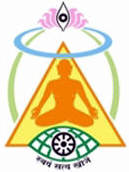
International Preksha Meditation Camp
1. Objectives of Preksha Meditation
- To enhance the power of concentration
- To live in the moment of divine bliss realizing boundless energy
- To pacify negative emotions and attain peace
- To attain physical, mental and emotional health
- To transform and transmute nature and behaviour
- Purification of consciousness
- To know the ultimate truth
- To keep a balance between action and inaction
2. Meaning of Preksha Meditation
- Preksha:
To perceive profoundly without the feelings of attachment and hatred
To go beyond mind
To be in the moment of divine bliss - Meditation:
Abstinence of mental, vocal and physical activities
Focusing the mind on any object
3. Metaphysical Basis of Preksha Meditation
- There is bondage
- There are causes of bondage
- There is freedom
- There are ways of attaining freedom
4. Elements of Preksha Meditation
- Kayotsarg - Total relaxation with self awareness
- Antaryatra - Internal journey
- Svash Preksha - Perception of long breathing
- Sharir Preksha - Perception of body
- Chaitanya Kendra Preksha - Perception of psychic centres
- Leshya Dhyan - Perception of psychic colours
- Anupreksha & Bhavana - Contemplation & auto suggestion
- Asana & Pranayam - Postures and control of breath
- Dhvani & Mudra - Healing sound & hand postures
5. Scientific Basis of Preksha Meditation
- Neuro-endocrine system regulates and governs human's actions
- Emotions and hormones responsible for good and bad activities
- Subconscious mind controls human behaviour
- Innate mechanism describes human personality
6. Special Features of Preksha Meditation
- Easy to learn and practice
- Scientific and systematic training
- Formulated for all age groups
- Holistic approach
- Approved by scientific experiments
- Propounded by H.H. Acharya Mahaprajna
7. Benefits and Outcome of Preksha Meditation
- Physical:
Bio chemical changes
Strengthens immune system
Sustains optimal health
Removes tension
Revitalizes body cells
Improves respiration and flow of vital energy - Mental:
Improves mental balance
Increases memory, concentration and decision power
Develops patience and tolerance power
Cleans and relaxes the mind
Enhances will power and builds self confidence - Emotional:
Transformation of negative emotions into positive
Removal of psychological distortions - Behavioural:
Increases working efficiency, creativity, detachment and good qualities
Change of habits and attitudes
8. Practice of Preksha Meditation
- Time: Before sunrise, half an hour before and one and a half hour after intake of food
- Duration: 10 to 45 minutes
- Location: Clean, pollution free environment in solitude
- Body Posture: Lotus, half lotus or crossed legs
- Hand Posture: Gyan posture or Jin posture
- Sounds Chanting: Mahaprana (humming sound), Arham, Om
- Aphorism: Sampikkhaye - appagamappayenam: see yourself through yourself
- Resolution: I am practicing P.M for the purification of my consciousness
- Steps:
-
- Kayotsarg - Relaxation of body by auto suggestion
- Antaryatra - Inner journey inside the spinal cord
- Svash Preksha - Long and rhythmic breathing
- Jyoti Kendra Preksha - Visualization of white colour at the centre of enlightenment
- Contemplation - Pacifying of emotions, development of tolerance power
- Conclusion: Vande Sachham – Bowing down to truth
Samani Charitra Pragya's lectures held during 3rd IPMC:

 Samani Charitra Pragya
Samani Charitra Pragya
